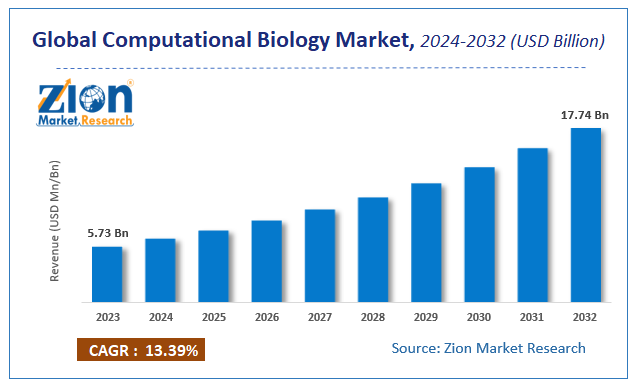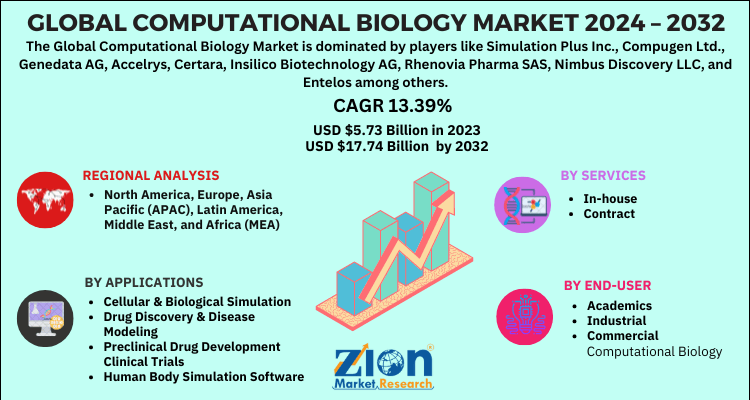Computational Biology Market Size, Share Report, Analysis, Trends, Growth 2032

Computational Biology Market By Services (in-house and contract), By applications (cellular & biological simulation, drug discovery & disease modeling, preclinical drug development clinical trials and human body simulation software), By end use (academics, industrial and commercial) And By Region: - Global And Regional Industry Overview, Market Intelligence, Comprehensive Analysis, Historical Data, And Forecasts, 2024-2032
| Market Size in 2023 | Market Forecast in 2032 | CAGR (in %) | Base Year |
|---|---|---|---|
| USD 5.73 Billion | USD 17.74 Billion | 13.39% | 2023 |
Description
Computational Biology Market Insights
According to the report published by Zion Market Research, the global Computational Biology Market size was valued at USD 5.73 Billion in 2023 and is predicted to reach USD 17.74 Billion by the end of 2032. The market is expected to grow with a CAGR of 13.39% during the forecast period. The report analyzes the global Computational Biology Market's growth drivers, restraints, and impact on demand during the forecast period. It will also help navigate and explore the arising opportunities in the Computational Biology industry.
Computational Biology Market: Overview
Computational biology is the science of learning and developed using experimental measurements. In simpler words, computational biology utilizes computers and computer technology (or digital technology) for studying and understanding the process of life. Algorithms are used which help in representation and interpretation of biological systems. From studying about the structure of biological molecules to analysis of function, the researches in computational biology have come a long way. Computer aided algorithms help in accurate simulation which review complexities in body in the virtual space. The computational methods comprise of analytical, mathematical and simulation.
Computational biology aids in researching for vaccination strain for various diseases including systems biology, cellular biology, biochemical studies, radiotherapy, genomic trends, genetic analysis, animal physiology, oncology, etc. Researchers use various tools and software for data collaboration, testing & studies, for instance, PLOS Computational Biology Software, Nature Computational Biology tools, etc. The applications of computational biology is not limited to research and drug discovery, the applications are being introduced in home health monitoring, diagnostics and implantable devices. There are high chances that computational biology can become a routine health care part and “internet of things” area can witness a lot of change with respect to computational biology.
Computational Biology Market: Growth Factors
Various factors in global computational biology market that are fueling the market presence include investments in research, sequencing, human genome product, etc. Growth in research and development sector for drug discovery is the major factor expected to drive the lucrative growth of the market. For instance, two years back, Ambrx Inc., collaborated with BeiGene, Ltd., for research work in protein therapeutics sector for incorporating a non-natural amino-acid into protein sequences. The research and clinical studies in bioinformatics, pharmacogenomics, pharmacokinetics is increasing with the growth of drug designing and disease modeling, thus growing the adoption of computational biology by researchers. The growth in computation biology is subjected to technological advancements in health care.
The digital technology introduced in health care has led to developments and discoveries that have helped aid many ailments which were regarded as non-curable. With the introduction of IT technologies, computational biology CROs are able to work worldwide remotely. These IT services increase the demographics & capabilities and help contract services to flourish all over the world. Other than that, various factors and recent developments, for instance, capacity building through activities, research funding by governments, training opportunities in bioinformatics are the major growth prospects helping the global computational biology market to create more advancements. With the growth aspects, some challenges that may restrain the market include protein structure prediction, homology searches, multiple alignment & phylogeny construction, genomic sequence analysis and gene finding.
The COVID-19 pandemic made a steady impact on global computational biology market as drug discovery and vaccination was the major need during the time. Bioinformatics work on studying biological systems and relationships which was required during COVID for drug discovery and to study the disease pattern.
Computational Biology Market: Segmentation
The global computational biology market is segmented based on factors such as services, applications, end use, and regions.
On the basis of applications, the market is classified into cellular & biological simulation, drug discovery & disease modeling, preclinical drug development clinical trials and human body simulation software.
Based on services outlook, the market can be classified into in-house and contract.
The end-use applications for the market comprise academics, industrial and commercial.
Computational Biology Market: Report Scope
| Report Attributes | Report Details |
|---|---|
| Report Name | Computational Biology Market |
| Market Size in 2023 | USD 5.73 Billion |
| Market Forecast in 2032 | USD 17.74 Billion |
| Growth Rate | CAGR of 13.39% |
| Number of Pages | 197 |
| Key Companies Covered | Simulation Plus Inc., Compugen Ltd., Genedata AG, Accelrys, Certara, Insilico Biotechnology AG, Rhenovia Pharma SAS, Nimbus Discovery LLC, and Entelos among others |
| Segments Covered | By services, By applications, By end use and By Region |
| Regions Covered | North America, Europe, Asia Pacific (APAC), Latin America, Middle East, and Africa (MEA) |
| Base Year | 2023 |
| Historical Year | 2018 to 2022 |
| Forecast Year | 2024 - 2032 |
| Customization Scope | Avail customized purchase options to meet your exact research needs. Request For Customization |
Computational Biology Market: Regional Analysis
North America is anticipated to be holding the dominating share in the global computational biology market. As the government in the region is focusing on medical sector, genetic based studies, and therefore investments from them for research and development is a key growth prospect. Collaborations among industries, growth in relationships among public and private sector are contributing towards the growth of computational biology market. The Unites States being the leading nation in synthetic biology, a future based technology for reprogramming of biological systems will offer ample opportunities for the market growth. The country is investing enormously since years for computation and synthetic biology. Asia Pacific is also holding a significant share and is expected to have fastest growth during the forecast period. This is mainly due to the government funds and foreign investments in countries of Asia, the region can be a good revenue holding market in the upcoming years.
Computational Biology Market: Competitive Players
The major players in the global computational biology market are working on mergers, promotions, and collaborations with other companies to gain market prominence. Also, with start-ups coming into picture, the competition is projected to increase in the upcoming years. The prominent players in the market include:
- Simulation Plus Inc.
- Compugen Ltd.
- Genedata AG
- Accelrys
- Certara
- Insilico Biotechnology AG
- Rhenovia Pharma SAS
- Nimbus Discovery LLC
- Entelos among others.
The Global Computational Biology Market is segmented as follows:
By Services
- in-house
- contract
By applications
- cellular & biological simulation
- drug discovery & disease modeling
- preclinical drug development clinical trials
- human body simulation software
By end use
- academics
- industrial
- commercial
Computational Biology Market: Regional Segment Analysis
- North America
- The U.S.
- Canada
- Europe
- France
- The UK
- Spain
- Germany
- Italy
- Rest of Europe
- Asia Pacific
- China
- Japan
- India
- South Korea
- Southeast Asia
- Rest of Asia Pacific
- Latin America
- Brazil
- Mexico
- Rest of Latin America
- Middle East & Africa
- GCC
- South Africa
- Rest of Middle East & Africa
What Reports Provides
- Full in-depth analysis of the parent market
- Important changes in market dynamics
- Segmentation details of the market
- Former, on-going, and projected market analysis in terms of volume and value
- Assessment of niche industry developments
- Market share analysis
- Key strategies of major players
- Emerging segments and regional markets
- Testimonials to companies in order to fortify their foothold in the market.
Table Of Content
Choose License Type
FrequentlyAsked Questions
Various factors in computational biology market are fueling the market presence such as investments in research, sequencing, human genome product, etc. Various factors and recent developments, for instance, capacity building through activities, research funding by governments, training opportunities in bioinformatics are the major growth prospects helping the global computational biology market to create more advancements.
The prominent players in the market include Compugen Ltd.; Simulation Plus Inc.; Genedata AG; Certara; Insilico Biotechnology AG; Accelrys; Rhenovia Pharma SAS; Entelos; Nimbus Discovery LLC; among others.
North America is anticipated to be holding the dominating share in the overall market. As the government in the region is focusing on medical sector, genetic based studies, and therefore investments from them for research and development is a key growth prospect.
HappyClients
Zion Market Research
Tel: +1 (302) 444-0166
USA/Canada Toll Free No.+1 (855) 465-4651
3rd Floor,
Mrunal Paradise, Opp Maharaja Hotel,
Pimple Gurav, Pune 411061,
Maharashtra, India
Phone No +91 7768 006 007, +91 7768 006 008
US OFFICE NO +1 (302) 444-0166
US/CAN TOLL FREE +1 (855) 465-4651
Email: sales@zionmarketresearch.com
We have secured system to process your transaction.
Our support available to help you 24 hours a day, five days a week.
Monday - Friday: 9AM - 6PM
Saturday - Sunday: Closed







